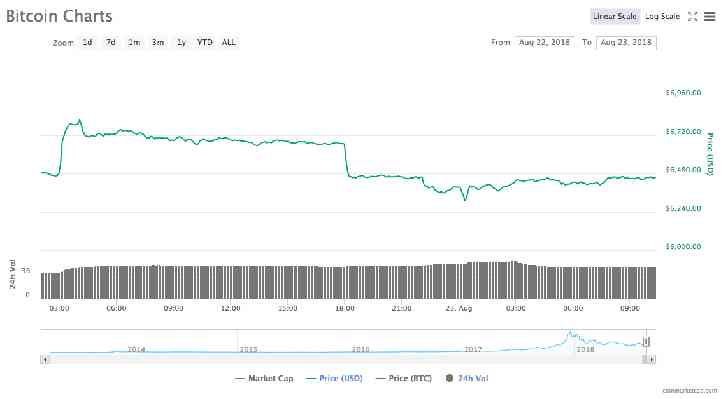Welcome to Hard Fork Basics, a collection of tips, tricks, guides, and advice to keep you up to date in the cryptocurrency and blockchain world.

If you’re into cryptocurrency trading you might have seen the acronym ETF bandied about from time to time. It’s becoming increasingly common as ETFs seek regulatory approval, but what exactly is an ETF and should you care about them?
Before we get into the nitty gritty of what an ETF is, it might help to know that it stands for Exchange Traded Fund – I said it might help. The “fund” bit is important though, so listen up.
So, what is an ETF?
ETFs are not a new invention. They have been traded on traditional stock exchanges for many years. Effectively an ETF packages up a commodity, index, or bundle of assets to create a fund. Shares in this fund are then traded on stock exchanges. As with all things traded on stock exchanges, prices will go up and prices will go down.
The important thing with ETFs though is that when you buy one, you never actually own the underlying asset packaged in that individual fund. You just own a share of that fund. As a shareholder you have rights to any profits the fund generates, but if the market tanks so will the value of the shares you hold. An ETF won’t make you immune to the market.
ETFs are a method financiers use to offer exposure to markets, while trying to reduce risk to investors.
Now what’s a cryptocurrency ETF?
In principle a cryptocurrency ETF is not that different to a conventional ETF. Rather than packaging commodities or assets, a cryptocurrency ETF packages – you guessed it – one or more cryptocurrency.
In a cryptocurrency ETF the fund would own the underlying assets it tracks and would sell shares of these assets. You should note, buying into an ETF means you’re not buying the assets it tracks, but you’re still being exposed to the market’s price fluctuations. Cool financiers call this “synthetic exposure” because it lets investors get into the market without actually buying into that market.
In some ways, buying an ETF can be safer than buying individual cryptocurrencies or tokens. In the US, custodians of ETFs are regulated by the Commodity Futures Trading Commission (CFTC) and must provide certain levels of transparency. The Securities Act of 1933 and Securities Exchange Act of 1934 dictate that custodians must disclose the performance of ETFs in annual reports to allow investors to make informed decisions.
Also, from a security point of view, it’s in the custodian’s interest to protect the assets held in that ETF, because without them their product is pointless.. When you hold coins yourself you’re always at risk of being hacked.
Extra security? That’s great, right?
Well, maybe.
For some, cryptocurrency adoption, no matter what form it takes, is a good thing. Others prefer to stay true to Bitcoin’s crypto-libertarian roots. A cryptocurrency ETF is an undeniable deviation Bitcoin’s original objective of creating a form of digital cash that exists outside of regulation and governmental control .
Whether cryptocurrency regulation is a good thing is another conversation, but it seems to gain the security of an ETF, you have to sacrifice some cryptocurrency-based freedom.
I want me some cryptocurrency ETFs now, please
Tough luck. At the time of writing there are no cryptocurrency ETFs in the US, but they are on their way. There are some products already on the market that are like ETFs, but differ in a couple of crucial ways.
Abra, a cryptocurrency wallet and exchange provider, recently launched its “BIT10” bundle . This “ETF styled” token tracks the top 10 cryptocurrencies of the month by marketcap. Sounds like an ETF, but it’s not as it can only be bought and traded on Abra’s platform. It’s also, by the traditional ETF definition, unregulated.
Coinbase also recently launched its “ Bundles ,” which have an air of ETF about them. A Coinbase bundle is a collection of the top five cryptocurrencies of the day, weighted by marketcap.
But again, they are not an ETF, because in this case you do actually end up owning the cryptocurrency assets in the bundle. In this case, Coinbase is just doing the legwork to buy and store your coins for you.
Others like ProShares , Direxion , and GraniteShares have all had their proposed cryptocurrency ETFs denied by the Securities and Exchange Commission (SEC) on the grounds that they could not satisfactorily demonstrate their ability to prevent fraudulent and manipulative acts and practices.
Ok, so if there are no ETFs, why should I care?
While there might not be any cryptocurrency ETFs on the market yet, understanding what an ETF is kind of important.
As cryptocurrency exchanges and platforms endeavor to grow their user base, being able to tell the difference between an ETF, a bundle, and market tracking tokens is crucial to making wise investments.
We’ll be publishing explainers on all of these in the near future, so keep an eye on Hard Fork. And make sure to join us at our very first cryptocurrency and blockchain event in London this December. More info here .
SEC ruling on Bitcoin ETF shatters hope for a cryptocurrency bull run
The US Securities and Exchange Commission (SEC) gave the much-awaited ruling on the pending Bitcoin exchange-traded fund (ETF) proposals on Wednesday, and it is not the news cryptocurrency industry was hoping for.

The agency rejected all the nine Bitcoin ETF proposals filed by ProShares , Direxion and GraniteShares in three separate orders, according to CNBC .
While all the three ETF providers gave their own reasoning for why a Bitcoin ETF should be granted, the SEC has rejected them on common grounds.
The agency notes that this rejection doesn’t have anything to do with whether Bitcoin and blockchain technology have utility or value as an innovation or an investment. Indeed, the SEC found that none of the exchanges could satisfactorily demonstrate their ability to prevent fraudulent and manipulative acts and practices.
The SEC also cited the inability of the exchanges to prove that Bitcoin futures markets are “markets of significant size” as the other reason to reject the proposals.
The SEC notes that it is important that the Bitcoin futures markets are of significant size, because the exchanges failed to prove their capability to prevent fraud and manipulation through others means. Therefore, “surveillance-sharing with a regulated market of significant size related to Bitcoin” is required to satisfy the legal requirements of preventing fraud and manipulation in the ETF trading.
It is worth noting that the SEC hasn’t approved any cryptocurrency ETFs to date. Last month, the agency rejected a Bitcoin ETF proposal filed by the Winklevoss twins for the second time. The agency gave similar reasoning for the rejection citing the “lack of surveillance-sharing with a regulated market of significant size.”
The SEC judgment comes as no surprise given its past rejections and reasoning. Nevertheless, many crypto-enthusiasts hoped a positive ruling could kick off a new bull run for cryptocurrency markets.
CNBC notes that Bitcoin prices spike in speculation every time a SEC ruling on ETFs is expected:
Even yesterday, before the SEC ruling, the price of Bitcoin increased by $400 in less than 20 minutes. Even though a direct connection with the SEC ruling can’t be established, CoinDesk notes that the anticipated Bitcoin ETF judgement was playing a major role in the trading sentiments behind the cryptocurrency.
“While prices could skyrocket if the SEC approves ProShares [B]itcoin ETF, the [B]itcoin market will likely crater if the SEC rejects the ETF or delays the decision,” Omkar Godbole notes for Coindesk.
But, not everyone is keen on SEC ruling affecting the market for Bitcoin. A group of Bitcoin supporters are arguing that SEC or ETFs play no role in affecting the market sentiments for the world’s apex cryptocurrency.
However, others — including Monero Project Lead Riccardo Spagni (better known as Fluffypony) — are pointing out that the SEC judgment and the approval of Bitcoin ETFs play a major role in getting Wall Street’s money flowing into Bitcoin and cryptocurrencies.
Interestingly, nearly 10 hours since the SEC ruling came out, the Bitcoin market doesn’t seem to have been affected all that much.. This could be a sign the cryptocurrency market has finally matured to a level that it doesn’t get swayed by every single news.


It is clear from the frequent rejections of cryptocurrency ETF proposals by the SEC and its reasoning that the US agency doesn’t believe that it’s the right time just yet.
The fact that cryptocurrency markets are subject to significant market manipulation (amidst a lack of regulations) isn’t exactly a revelation to anyone. Perhaps, it is better for the cryptocurrency industry to advocate for better market regulations before expecting SEC to approve ETFs.
EY crowns cryptocurrency wallet maker Ledger as Parisian startup of the year
International business bigwigs have just given the nod to French cryptocurrency storage device manufacturer Ledger. The company has won EY’s Startup of the Year Award for the Ile-de-France region.

Global accountancy giant EY runs an annual competition to find France’s best new businesses. Le Prix de l’Entrepreneur de l’Année features three categories: best entrepreneur, startup, and social commitment.
This year, a cryptocurrency business has found some early success. EY confirmed it has awarded Ledger with the title of best startup in its native region, Ile-de-France.
Ledger will move into the next round of competition, where it will go toe-to-toe with eight other startups for various awards. Of the finalists, just one winner will advance to compete for the global prize.
In July, Forbes reported that Ledger generated $29 million in profits last year, after selling more than a million cryptocurrency devices.
That aside, the company has not been immune to occasional tech difficulties. Earlier this year, researchers discovered a vulnerability in Ledger devices that left users open to “man-in-the-middle” attacks.
A few months later, security researcher Saleem Rashid discovered Ledger had done little to protect its devices from physical attacks .
In response, the company confirmed that customers must only purchase its cryptocurrency wallets from Ledger directly, or from a strict list of pre-approved resellers.
The good thing is that – unlike other cryptocurrency storage solution providers – Ledger has been responsive to researchers’ criticism. This is also why most crypto-insiders continue to place their trust in its wallet devices.











